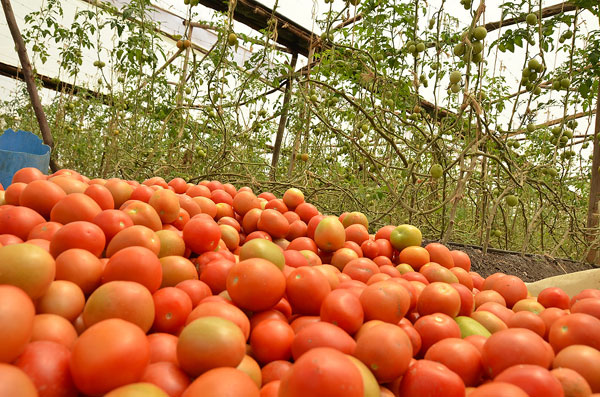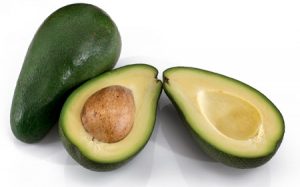Greenhouse tomato farming in Kenya has led to a huge increase in tomato production. Most tomato farmers in Kenya practice small scale greenhouse farming of popular greenhouse tomato varieties such as Anna F1. You can make quick money in Kenya through greenhouse cultivation of tomato.
Growing plants in a greenhouse allows for easier implementation of good agronomic practices and reduces tomato production costs. Pilipili hoho (Capsicum) and onions are the other crops in Kenya that are commonly grown in a greenhouse. With almost all varieties, greenhouse tomato farming is more profitable than growing tomatoes outdoors.
It is easier to control the temperature inside a greenhouse and less water is used when the correct irrigation method is used. Most Kenyan farmers use drip irrigation in their greenhouses. Excess nutrients in a tomato farm will lead to excessive vegetative growth at the expense of fruit development, leading to smaller and lighter fruits, and hollow tomatoes that go bad quickly.
Farmers are advised to deliver liquid fertilizers with the drip irrigation system to avoid giving their tomatoes excess nutrients. Tomatoes are a popular vegetable and are always in high demand. Most small scale greenhouse farmers in Kenya prefer to grow tomatoes. The benefits of greenhouse tomato farming in Kenya include:
Advantages of Greenhouse Tomato Farming in Kenya

Greenhouse Tomato Farming in Kenya (A Kenyan Greenhouse)
- Minimum water wastage – drip irrigation systems that are mostly preferred in greenhouses have no surface run-off since the water is delivered directly to the root area of the plants. Water is distributed uniformly, which prevents clogging.
- Easier to manage weeds – unlike watermelon farming in Kenya that requires a lot of space, tomatoes grown in small scale greenhouses consume less space but produce more fruits per acre. The planting of tomatoes in a concentrated space makes weeding easier. Moreover, use of drip irrigation denies weeds the water they need to thrive.
- Easier to manage tomato diseases – the closed nature of small scale greenhouses reduces the risk of soil-borne tomato diseases. These diseases spread when wet soil is splashed onto tomato leaves while it rains (or when using overhead irrigation systems). Drip irrigation reduces the amount of moisture on the tomato leaves, further reducing the risk of fungal tomato diseases that thrive on wet foliage. Pest control is also easier in a greenhouse than with outdoors tomato farming. Birds are a huge nuisance for outdoor tomato farmers: beat them by adopting greenhouse tomato farming in Kenya.
- Less labor – delivering liquid fertilizers in irrigation water is one form of automation that drastically reduces labor requirements in a greenhouse. Good space utilization in small scale greenhouse farming means there is less distance to cover when tending to your tomatoes. Tomatoes need staking to support the weight of the fruits and to grow upright. It is easier to stake your tomatoes with greenhouse tomato farming in Kenya.
- Less theft – Tomatoes planted through greenhouse tomato farming in Kenya are well hidden from view. Would-be thieves can not know when the tomatoes are ripe and ready for harvesting. Stealing of farm produce is a big problem in some regions in Kenya, especially in the Central region.
- Out-of-season Production and big profits – farmers who plant tomatoes in a greenhouse are not bound to the natural rainfall patterns. They supply tomatoes to the market throughout the year especially when there is a weather-induced drop in tomato production. This is when tomatoes fetch the best prices and bring in the most profit. Since we don’t have a winter in Kenya, the only critical element needed for a year-long tomato production in Kenya is water. Temperatures are favorable for tomatoes almost all year long. The cold season lasts for only 3 months and is easily overcome by the warmer environment inside a greenhouse. In contrast, greenhouse tomato farmers in countries such as U.S. and Canada incur extra heating and lighting costs during winter.
GreenHouse Tomato Farming in Kenya
Tomatoes are good for people who are looking for whole health remedies. Tomatoes grown under greenhouse tomato farming in Kenya are better protected from strong wind, strong sun, hail and changes in humidity levels.
High yielding tomato varieties in Kenya such as Anna F1 tomato perform best in a greenhouse. Plant resistant tomato varieties such as the Prostar F1 by Kenya Seed Company. Use greenhouse tomato farming in Kenya to increase yields, grow tomatoes all year and increase tomato farming profit.
Share On Your Favorite Social Media!
Use the following links to spread the word...



